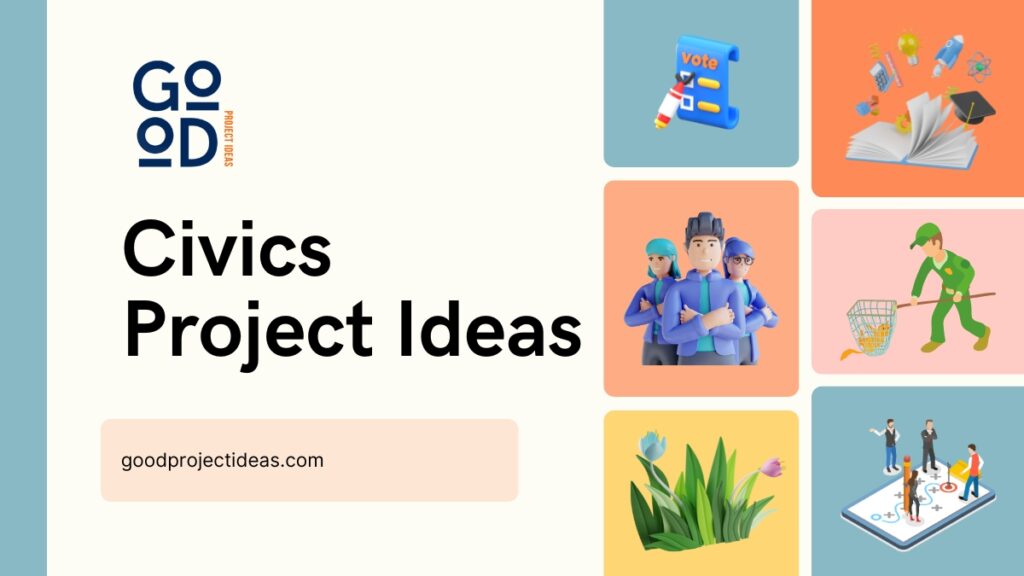Looking for exciting civics project ideas? Dive into hands-on activities that explore citizenship and government. Get ready to learn, engage, and make a real impact in your community!
Hey, let’s dive into some cool civics projects! We’re talking about how governments tick, our roles as citizens, and ways to get involved in making our communities awesome. These projects are like real-life adventures where you learn about laws, rights, and how to make a positive impact. Ready to explore and have fun while learning? Let’s check out these ideas together!
Importance of Civics Education
Civics education is vital for democracy because it:
- Empowers Citizens: Teaches rights, responsibilities, and holding leaders accountable.
- Informs Participation: Helps critically evaluate information and form opinions.
- Encourages Engagement: Prepares for voting, volunteering, and speaking out.
- Strengthens Society: Engaged citizens lead to a stronger, more informed community.
Benefits of Doing a Civics Project
Participating in a civics project brings civics knowledge to life! Here’s why it’s great:
- Real-World Application: Makes learning engaging and relevant.
- Skills Development: Builds essential skills like research and problem-solving.
- Make a Difference: Contributes positively to community issues.
- Boost Confidence: Completing a project boosts confidence in creating change.
- Leadership Potential: Develops leadership skills by working with others.
- College & Career Prep: Demonstrates valuable skills and civic engagement.
In short, civics projects help apply learning, develop skills, and prepare for success.
How to Choose a Civics Project Topic
Choosing a civics project topic is exciting! Here’s a simple guide:
- Interests: Pick something you care about.
- Local vs. Global: Decide if it’s for your community or broader.
- Action or Info: Choose to raise awareness or take action.
- Feasibility: Ensure it’s manageable with your resources.
For ideas
- News: Check news for issues you’re interested in.
- Community: Ask local groups about needs.
- Government: Explore government sites for topics.
Remember, choose what you’re passionate about and can contribute to. Good luck!
Civics Project Ideas Based on Grades
Check out civics project ideas based on grades:-
Elementary School (Grades K-5)
- Focus: Introduce community, government, and citizenship basics.
- Ideas:
- Create a mural of community helpers.
- Research and present a local hero.
- Write a letter to a local official.
- Organize a school clean-up.
- Hold a mock class president election.
Middle School (Grades 6-8)
- Focus: Understand government structures and rights.
- Ideas:
- Present on a Constitution amendment.
- Debate a local or national issue.
- Conduct mock trials.
- Interview a local politician.
- Create a voter registration PSA.
High School (Grades 9-12)
- Focus: Develop critical thinking on civic issues.
- Ideas:
- Research a policy’s impact.
- Make a documentary about a social justice issue.
- Volunteer for a non-profit and analyze their role.
- Organize a voter registration drive.
- Develop a local government initiative proposal.
Remember, these are starting points! Be creative and tailor your project to your interests and goals.
Civics Project Ideas Based on Difficulties
Here are some civics project ideas categorized by difficulty level:
Beginner (Less Time & Resources Needed)
- Voter Registration Drive: Organize a drive at school or in your community.
- PSA Creation: Make a short video or social media post about a civic topic.
- Mock Interview: Interview a local leader or official to learn about their role.
- Community Leader Interview: Talk to a leader about their work and impact.
- “Thank You” Campaign: Write cards to thank local public servants.
Intermediate (More Research & Planning)
- Policy Analysis: Study a local policy and suggest improvements.
- Comparative Analysis: Compare voting or government systems in different countries.
- Documentary or Podcast: Create a short film or podcast about a local issue.
- Debate Organization: Arrange a debate on a current local topic.
- Community Needs Assessment: Identify and suggest solutions for a local need.
Advanced (Extensive Research & Action)
- Volunteer Project with Advocacy: Volunteer and raise awareness for a cause.
- Campaign for Change: Lead a campaign for a specific policy change.
- Local Government Proposal: Research and propose solutions for a local issue.
- Community Forum: Organize a forum to discuss a complex local issue.
- Public Art Project: Create art to raise awareness about a civic issue.
Civics Project Ideas Based on Interest
Check out civics project ideas based on interest:-
Interested in the Environment?
- Clean up a local park.
- Improve local waste management.
Into Technology?
- Create a voting registration app.
- Study social media’s impact on politics.
History Fan?
- Explore a historical landmark.
- Learn about voting rights struggles.
Love Art & Music?
- Host an art exhibit.
- Paint a mural on social issues.
Sports & Fitness Enthusiast?
- Organize a charity sports event.
- Improve park accessibility.
Tailor these ideas to your interests and passion for civic engagement!
Civics Project Ideas
Check out civics project ideas:-
Elections and Voting
- Create a voter education campaign.
- Analyze voter turnout data.
- Design a polling location app.
- Survey voter attitudes.
- Organize a mock election.
- Research voting rights history.
- Create a election milestones timeline.
- Analyze social media’s election impact.
- Volunteer as a poll worker.
- Study gerrymandering’s effects.
Government Structures
- Create a model government.
- Compare government structures.
- Research lobbyist roles.
- Analyze term limits.
- Study third-party impact.
- Chart government powers.
- Interview a local official.
- Research political parties.
- Create a checks and balances presentation.
- Organize a political debate.
Civic Engagement
- Volunteer at a nonprofit.
- Organize a clean-up event.
- Create a civic awareness campaign.
- Interview community members.
- Start a petition.
- Research civil rights history.
- Volunteer at a community center.
- Create an immigrant guide.
- Organize a charity fundraiser.
- Attend a council meeting.
Rights and Responsibilities
- Create a rights poster.
- Research civil rights movements.
- Volunteer at a polling place.
- Write to an elected official.
- Organize a jury duty workshop.
- Create a voting rights video.
- Study media impact.
- Interview a lawyer.
- Research a Supreme Court case.
- Organize a free speech debate.
Public Policy
- Analyze legislation impact.
- Create a budget.
- Study climate policy.
- Interview a government official.
- Research policy history.
- Analyze lobbying impact.
- Study a government program.
- Research social welfare history.
- Create a policy proposal.
- Organize a policy panel.
Community Issues
- Survey community needs.
- Create a resource map.
- Volunteer at a center.
- Research a community’s history.
- Organize a town hall.
- Interview residents.
- Create a community involvement guide.
- Study gentrification.
- Organize a community fundraiser.
- Create a community diversity video.
Global Citizenship
- Research human rights agreements.
- Volunteer globally.
- Create a responsible tourism guide.
- Study globalization’s impact.
- Interview immigrants.
- Organize a cultural exchange.
- Research a global conflict.
- Create a UN presentation.
- Study foreign aid impact.
- Organize a global charity fundraiser.
Media Literacy
- Create a fake news guide.
- Analyze media coverage.
- Interview a journalist.
- Research media ownership.
- Organize a literacy workshop.
- Create a media campaign.
- Study social media’s impact.
- Analyze media’s opinion shaping.
- Interview a media critic.
- Research a media outlet’s history.
Environmental Citizenship
- Volunteer for an environmental group.
- Create a carbon footprint guide.
- Study pollution’s impact.
- Interview an activist.
- Research conservation history.
- Organize a green event.
- Create a biodiversity presentation.
- Study climate change effects.
- Interview a scientist.
- Research an environmental disaster.
Digital Citizenship
- Create an online safety guide.
- Analyze social media’s impact.
- Interview a cybersecurity expert.
- Research internet regulation.
- Organize a digital literacy workshop.
- Create an online civility campaign.
- Study online activism’s impact.
- Analyze algorithm impact.
- Interview a digital rights advocate.
- Research an internet company’s history.
Civic Education
- Create an elementary civics curriculum.
- Analyze high school civics education.
- Interview a civics teacher.
- Research civics education history.
- Organize a civics trivia night.
- Create a parent’s civics guide.
- Study extracurricular civic engagement.
- Interview a politician.
- Research a civics textbook.
- Organize a civics education debate.
Legal Studies
- Create a legal rights guide.
- Analyze a Supreme Court case.
- Interview a lawyer.
- Research a legal precedent.
- Organize a mock trial.
- Create a legal aid presentation.
- Study tech’s legal impact.
- Interview a judge.
- Research a legal reform.
- Organize a legal panel.
Social Justice
- Volunteer for a justice group.
- Create a social change guide.
- Study systemic racism.
- Interview a justice activist.
- Research a justice movement.
- Organize a protest.
- Create a diversity presentation.
- Study poverty’s justice impact.
- Interview a leader.
- Research a justice reform.
Philanthropy
- Volunteer for a charity.
- Create a giving guide.
- Study philanthropy’s impact.
- Interview a philanthropist.
- Research philanthropy history.
- Organize a charity fundraiser.
- Create a giving back presentation.
- Study CSR programs.
- Interview a director.
- Research a charity’s history.
Ethics and Values
- Create an ethics code.
- Analyze an ethical issue.
- Interview an ethicist.
- Research ethical philosophy.
- Organize an ethics debate.
- Create an ethical behavior presentation.
- Study religious values’ impact.
- Interview a leader.
- Research an ethical dilemma.
- Organize an ethics workshop.
What is an example of a civic project?
Check out the example of a civic project:-
Project Title
Clean Park, Green Future
Project Goal
Keep our local park clean and teach kids about helping the environment.
Activities
- Look at the park to see where there’s trash.
- Make posters and papers about why trash is bad for animals and nature.
- Work with the park people to plan a day to clean up the park. Tell everyone about it online and at school.
- On cleaning day, help pick up trash and put it in the right places.
- After cleaning, talk to the park people about how to keep the park clean.
Benefits
- Teaches kids about why it’s important to keep places clean.
- Gives kids a chance to make their park better.
- Makes the park nicer for everyone.
- Helps kids and park people work together to care for the park.
This project is easy to do and helps make our world a better place!
What to do for a civics project?
Check it out:-
- Find Your Interest: Choose what topics you like, such as environment, justice, education, or tech. Look for news or events you find interesting.
- Choose Your Level: Decide how much time and effort you can give. Easy projects can be voter registration or interviews. Medium ones could be research or documentaries. Harder ones might involve volunteering or proposing ideas to leaders.
- Pick Your Topic: Focus on a specific issue you can handle. For example, if you like the environment, you could clean up a park or promote recycling at school.
- Research & Plan: Learn from good sources and make a plan with goals and steps.
- Take Action: Do what you planned, like organizing events, talking to people, or making things.
- Share (Optional): Tell others about your project through social media or presentations.
- Think Back: After you finish, think about what you learned and how you can do more in the future.
Remember to have fun and make a positive difference!
What are some civic ideas?
Here are some ideas to inspire you:
Community Engagement
- Organize a volunteer drive for a local cause.
- Help establish or maintain a community garden.
- Start a neighborhood watch program.
- Partner with local organizations to mentor younger students.
Education & Awareness
- Organize a voter registration drive.
- Develop a campaign to raise awareness about local issues.
- Host mock elections or debates.
- Conduct financial literacy workshops.
Government & Policy
- Research and propose improvements to local policies.
- Lobby for a specific policy change.
- Shadow a local official to learn about their work.
- Organize public forums to discuss local issues.
Creative Expression
- Create public art reflecting a local issue.
- Make a documentary or podcast about a local topic.
- Write a song or create a video promoting civic engagement.
- Develop a board game or app teaching civics.
What is considered a civic project?
A civic project is an activity that helps the community and gets people involved. Here’s what a civic project is about:
- Helps the Community: It works on a problem that affects the community, like helping the environment or education.
- Gets People Involved: It encourages people to learn and do more in their community. This could mean helping others, teaching about local issues, or organizing events.
- Takes Action: It’s not just talking about an issue. It’s doing something to fix it, like volunteering, organizing events, or suggesting new rules.
- Can Be Alone or Together: You can do a civic project by yourself or with others, like friends or groups.
Examples of civic projects
- Cleaning up a neighborhood.
- Helping at a soup kitchen or shelter.
- Learning about a local law and suggesting changes.
- Making art that shows a community issue.
- Creating a website or app to help people vote or learn about the government.
Find something you care about and make a difference in your community, even with a small project!
Conclusion
These civics projects are kind of like a guidebook for students. They help us see how societies tick, why it’s important to be active in our communities, and how we can tackle tricky problems. It’s not just about memorizing stuff; it’s about figuring out how to make things better around us.
When we dive into these projects, we learn cool skills like thinking hard about things and working together with others. It sets us up to be smart, caring folks in our neighborhoods.



